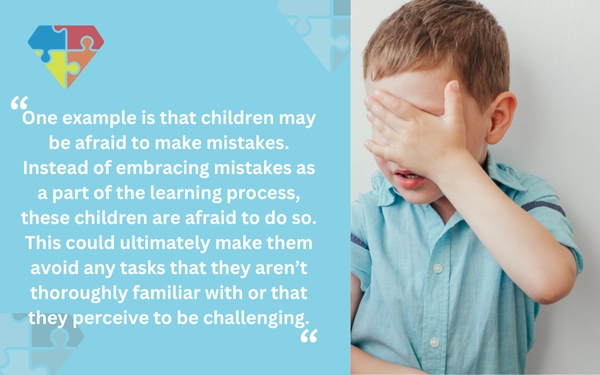Can ABA Treat perfectionism?
As they grow and learn new things, some children develop what is known as perfectionism. This can be defined in many ways, but generally refers to when one always strives to do things perfectly, and gets upset if they don’t do so.
On the surface, this trait might not seem negative. After all, if children strive to be perfect, they are likely to be very engaged and motivated to keep trying.
At the same time, perfectionism can also be damaging, as it can cause a person to become stressed, frustrated and anxious when they don’t do everything perfectly.
Applied behavior analysis (ABA therapy), which is considered the gold standard of treatments for children with autism spectrum disorder (ASD), provides many strategies to help with this. It can be used for children of all abilities, regardless of their neurodevelopmental abilities.
In this article, we’ll discuss how ABA therapy can help children manage perfectionism.
Table Of Contents
What Defines Perfectionism in Children?
Perfectionism and children can manifest itself in a number of ways. The negative aspects of it can actually interfere with their ability to manage their day properly.
One example is that children may be afraid to make mistakes. Instead of embracing mistakes as a part of the learning process, these children are afraid to do so. This could ultimately make them avoid any tasks that they aren’t thoroughly familiar with or that they perceive to be challenging.

Children with perfectionism often set expectations for themselves that are unrealistically high. While it’s good to “shoot for the moon,” the expectations are often impossible to meet, which results in them having trouble being satisfied with themselves.
Along those lines, these children are often very self-critical. They might have low self-esteem and feel inadequate a lot, especially when they don’t meet the unrealistic standards they’ve set for themselves.
At the same time, perfectionism can often cause children to be very sensitive to the criticism of others. Even if it’s constructive feedback, children might interpret this as being a failure.
Finally, children with perfectionism might have a low tolerance for frustration. They might become frustrated very easily when they can’t achieve what they think they can or if things aren’t going as they planned.
How Can ABA Therapy Help Manage Perfectionism in Children?
ABA therapy is a science- and evidence-based approach to learning that can help children gain new skills and modify certain negative and/or harmful behaviors. While it’s commonly associated with children with autism, it can be used in effective ways to help children manage perfectionism, even if they aren’t on the autism spectrum.
A fundamental concept of ABA therapy is task analysis, which breaks down complicated concepts into smaller and more manageable steps. This approach enables children to manage tasks in a simple way, which helps reduce anxiety and feelings of being overwhelmed that are often associated with high expectations.
In addition to removing many of the pressures of completing tasks, this strategy can actually foster growth mindsets.
ABA therapy integrates positive reinforcement into all of its treatment plans. This includes a reward of some sort that’s personalized to the child’s preferences that is meant to recognize them for their accomplishments and keep them engaged and motivated to learn more.
These reinforcements are presented to children in ABA therapy as they make progress — not as they complete larger tasks. This emphasis on progress instead of perfection teaches children that it’s OK for them to improve instead of just focusing on achieving perfection right away.
Like other aspects of ABA therapy, parental involvement is also critical to helping children manage perfectionism. Since they are the ones who are around the child most often, it’s key that they are equipped with the knowledge, strategies and tools to help support their children.
That’s why ABA therapy works to integrate parents, caregivers and other family members into the treatment program. By doing this, parents can help reinforce the skills learned in therapy sessions in practical, real-world scenarios.
Blue Gems ABA Helps Children Manage Perfectionism
Perfectionism may sound like a desirable trait on the surface, but it can be very damaging to children in the long run. In fact, it can stand in the way of children learning to grow and master skills they’ll need to succeed in life.
At Blue Gems ABA, we help children manage perfectionism, regardless of what their developmental abilities are. We always craft personalized ABA therapy treatment plans that are customized to each patient’s unique strengths, challenges and preferences so that we can provide targeted interventions that work.
To learn more, please contact us today.




